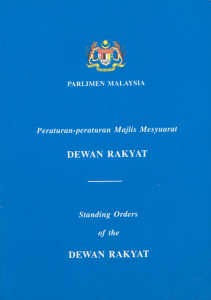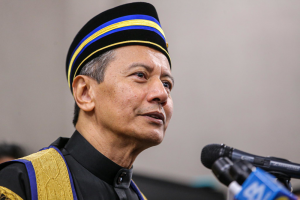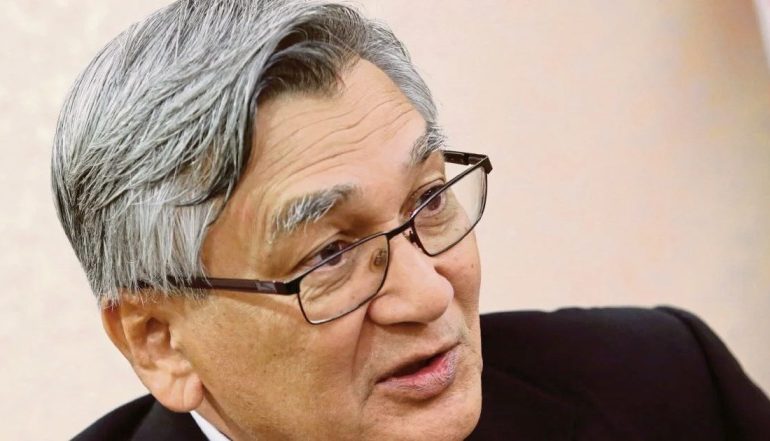Does the Speaker remain in office after the dissolution of Parliament?
The Speaker stays in office until he resigns, or another Speaker is appointed when the next parliament convenes.
[1] Parliament is dissolved, and elections are completed
On October 10, 2022, the 14th session of the Malaysian Parliament was dissolved.
On the 19th of November 2022 General Elections were held.
On the 24th of November 2022, the King appointed a new prime minister.
[2] Request to send in a list of MPs to the Speaker of Parliament
Between these two dates, Comptroller of the Royal Household, Istana Negara, (Datuk Seri Ahmad Fadil Shamsuddin) requested that potential prime ministerial candidates ought to hand over to the Speaker of Parliament, Tan Sri Azhar Azizan Harun, a list of MPs who supported them. 1 New Straits Times, November 20, 2022 @ 2:34pm, https://www.nst.com.my/news/nation/2022/11/852948/ge15-istana-negara-wants-parties-submit-finalised-coalitions-and-pm
[3] This provoked two questions:
Question 1: Is the Palace’s request a requirement of the Federal Constitution?
One need not be troubled by the first question: there is no such requirement in the Federal Constitution. The King’s advisors no doubt know this. Why it happened is a great mystery, and a mystery it shall remain.
Question 2: Did the Speaker’s office fall vacant when Parliament was dissolved on October 10th, 2022?
[4] The answer to Q2 is buried in several legal provisions
These are in the Federal Constitution, the Houses of Parliament (Privileges and Powers) Act 1952, and the Standing Orders of the Dewan Rakyat and parliamentary conventions.
[5] The Dewan Rakyat is a master of its own procedure
We start with the proposition that the Speaker is a member of the Dewan Rakyat.2Article 57(1A)(b)
Second, Article 62(1), states that:
‘… each House of Parliament shall regulate its own proceedings’.
Only the Dewan Rakyat has the final say on the validity of what procedures it adopts.
The Dewan Rakyat’s Standing Orders are important. These Orders regulate the conduct within parliament. Article 62 says so.

(Photo: Parliament Website)
Even if there is a vacancy, or absence of key individuals, the Dewan Rakyat can proceed with its work. Such absence, ‘shall not’, the Constitution says, ‘invalidate’ parliamentary ‘proceedings’. 3Article 62(2), Federal Constitution
[6] Standing Order 3 makes a surprising statement:
Standing Order 3 states:
“ …[Whenever] there is a vacancy in the office of [the Speaker ] whether as a result of a dissolution of parliament or otherwise…, as soon as a quorum is present, the House shall … elect [a Speaker].”
This seems to suggest that the moment there is a dissolution of Parliament, the office of the Speaker is vacated.
But note that this almost absolute power is ‘subject to’ two laws: the Federal Constitution, and federal law.4Article 62(1).
We shall come to that shortly.
[7] An ambiguity…
Article 57(2), Federal Constitution states that,
‘The Speaker may at any time resign his office,… and shall vacate his office — (a) when the House first meets after a general election…’.
[8] What does the phrase ‘… [The] Speaker … shall vacate his office… when the House first meets after a general election’, mean?
One view is that the previous Speaker loses his office when Parliament is dissolved. This arises from the words of Standing Order 3.
The other arises from Art 57(2), which states that the Speaker keeps his office until the house first meets after a general election.
And, until such time, unless he resigns his office, the Speaker stays in power.

(Photo: News Straits Times)
[9] Then there is a Pre-Merdeka Act, the Houses of Parliament (Privileges and Powers) Act 1952.
Section 28 of that Act states that:
‘… the person who fills the office of… [the Speaker], at the time of dissolution of parliament to be deemed to be… [the Speaker] until parliament is again summoned or until another person has been chosen to be [the Speaker ] of the House of Representatives…’
Section 28 clarifies that even after dissolution, the office of the Speaker of Parliament is unaffected.
Although the Act is before Merdeka, the Constitution requires that it shall be construed to accord with the Constitution. Section 28 does accord with Article 57(2). There is no conflict.
[10] Conclusion
Thus, the Speaker remains in office until one of two events occurs: –
(a). he resigns,
(b). until the next parliament meets, when it either elects or selects its own Speaker.
[The author expresses his gratitude to KN Geetha, GS Saran, JD Prabh, and RJ Nevina]
Acknowledgment:
(Thumbnail Photo: News Straits Times)





